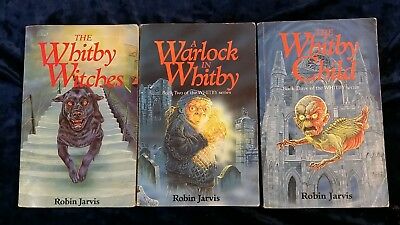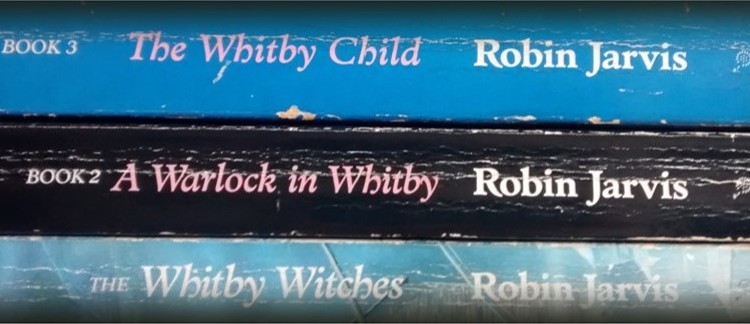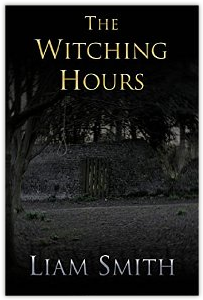The Whitby trilogy by Robin Jarvis is one of the best trilogies… ever. This is a Whitby Witches review of sorts, but one which explores the trilogy’s place in literature instead of trying to rate it against other books.
I first read Robin Jarvis’ The Whitby Witches when I was a child. I can’t have been any older than ten, because by the time I finished the series I had yet to leave primary school. And actually, I didn’t read them – my mum read them to me. It was probably her eyes that first alighted upon that fateful tome, bound with a leering hound front cover that arrested both our attentions in that little library up the road. We devoured it swiftly and ordered the sequels shortly after. After reading and loving those too, I requested the boxset from my Grandma for Christmas. She even lived near Whitby! Finally, I owned those fantastic stories for myself.

I re-read the trilogy a few of times as a child. Yyou can see how well-loved those books were in the picture above. But I hadn’t done so since before my late teens. By the time I took them from the shelf a couple of months ago it must have been ten years since I’d indulged. I thought I’d give them a read for a bit of a nostalgia hit, but even before I’d reached the halfway point of Book One I knew that I was reading something truly special. It wasn’t my childhood love of The Whitby Witches that was informing my enjoyment of it. It was simply that it is a fantastic, gripping and scary book. I finished the trilogy’s finale, The Whitby Child, this very morning – and I can’t wait to laud its brilliance.
Books that re suitable for young adults don’t have to be young adult books
As a child, I made no attempt to decode themes in books, or evaluate characterisation, or analyse the language used therein. Enjoyment was paramount, as it should be for all books. But as an adult, I like to enjoy my reading from a critical perspective too, hoping it will inform and improve my own reading and writing skills. But this was difficult for the Whitby series, because I found myself dragged into it like a child in a riptide, able only to hang on to the flotsam of the characters as the plot surged away without a thought for linguistic critique. However, I think I can discern the secret to the excellence of these books.
Robin Jarvis does not patronise his audience. Ostensibly, The Whitby stories are children’s books. Indeed, my mum and I found The Whitby Witches in that section of our local library. But that doesn’t stop Jarvis from telling the story he wants to, in all its gothic glory.
Throughout the books there are all kinds of ghouls and ghosts and gory murders, magic and mystery and mutilations. The two main protagonists are children, but few other characters are below the age of forty. Magic is not a thing of pointy-hatted student wizards but something grown from the world of séances and religion. It is still mysterious even in our real, scientifically advanced world. There is no desire here to pander to the conventions of children’s fiction, and I think this is why my mum enjoyed reading me the books as much as I enjoyed listening to them. They were suitable for me because there was no outright swearing or sex, but they were suitable for her too. She could see that the world of Whitby is an adult’s one, with real dangers faced by its denizens.
In the horror tradition
I get the feeling that Robin Jarvis is well-read in the fields of horror and the occult. The Whitby trilogy displays such a deep knowledge of the subject that is only glimpsed indirectly in its pages.
A key antagonist of the series is a Crowley-esque magician, charismatic and cruel. He is no two-dimensional villainous construct, but a fleshed-out creature who consistently though subtly draws from traditions of the magic orders like the Golden Dawn and from occult convention. The Lords of the Deep, deities of the ocean, are not the expected Olympian titans of fantasy. Instead they follow the Lovecraftian blueprint – not merely tentacled but terrifying in their vastness and their indifference. Even the setting of Whitby, with its moonlit abbey, roaring waves and timeless history, is straight out of the leather-bound pages of gothic romance. I’d like to think that reading these books all those years ago laid (or at least cemented) the foundations of my keen interest in all things supernatural, nocturnal and horrifying.
Mastery of language
A few words have to be spent applauding Jarvis’ language too. Just as his stories inhabit the twilight between children’s and adult fiction, so his language matches perfectly. There are examples of advanced vocabulary – the words “dragooned” and “athame” spring to mind – but they are ably supported by the kind of delectable prose employed by authors who love the sound and effects of words. Those who treat words with a particular reverence and pleasure, rather than just using them to assemble a story. Such mastery of language is what helps Jarvis to control his content. Because the books aren’t drenched in crude, lurid descriptions of blood and violence, moments where such things are described hit all the harder. All without dwelling too perversely in the details and upping the age-certificate.
There we have it: a few words and reflections on The Whitby Witches. When books are as good as these, I’d recommend them to anyone, whether fans of horror, or fantasy, or neither. I’m hoping I can learn a few lessons from them to implement in my own writing too.
Right. I’m off to explore more of Robin Jarvis’ bibliography.

